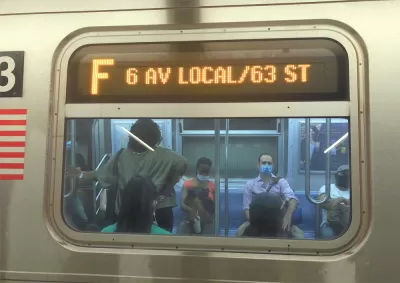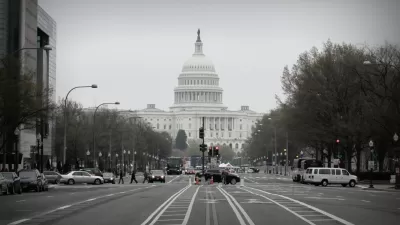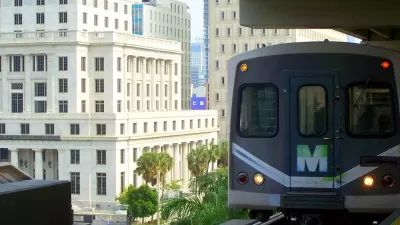A new economic stimulus package that appears headed for approval as of this writing will give $15 billion to public transit, far less than transit advocates had hoped, but far better than nothing.

Kea Wilson writes: "Congress is racing to pass a coronavirus relief bill that would throw transit agencies across the country a life raft — but as the saying goes, we’re going to need a bigger boat."
The COVID-19 Emergency Relief Act of 2020, as the new relief package is called, is a long time coming. The federal government approved its last stimulus package, the CARES Act, in March, and let another stimulus package called the HEROES Act, approved by the House of Representatives in May, languish in the Senate.
According to Wilson, the Emergency Relief Act of 2020 "would grant $15 billion to mass transportation agencies to be distributed on the basis of Federal Transit Administration formulas, restricting each urbanized area to a maximum of $4 billion. "No large city can receive more than 75 percent of its 2018 operating budget from the grants, and experts don’t expect there to be much left over after every small agency gets its initial cut," adds Wilson.
For transit agencies facing an existential crisis because of plummeting revenues of all kinds (sales and gas tax revenues are down in addition to fare receipts), the new funding will provide only a temporary relief, as mentioned by Wilson in the lede.
As noted by Wilson, advocates were hoping for funding on the order of $32 billion to help transit agencies weather the storm. Jeff Davis of the Eno Center for Transportation is quoted in the article saying that the funding should get "everyone" through March 31. A Tweet by Yonah Freemark also provides a breakdown of the expected allotments to specific transit agencies.
OK, revised estimates suggest that the new COVID Act should provide agencies:
- NY MTA ~$2.5-4b
- CTA ~$305m
- WMATA ~$530m
- NJT ~$305m
- MBTA ~$500-650m
- SEPTA ~$350m
(The 75% rule applies to *both* CARES & the new COVID Act--this will free up money for MTA, MBTA)— Yonah Freemark (@yfreemark) December 15, 2020
FULL STORY: New COVID-19 Relief Bill Starves Transit — Again

Planetizen Federal Action Tracker
A weekly monitor of how Trump’s orders and actions are impacting planners and planning in America.

Map: Where Senate Republicans Want to Sell Your Public Lands
For public land advocates, the Senate Republicans’ proposal to sell millions of acres of public land in the West is “the biggest fight of their careers.”

Restaurant Patios Were a Pandemic Win — Why Were They so Hard to Keep?
Social distancing requirements and changes in travel patterns prompted cities to pilot new uses for street and sidewalk space. Then it got complicated.

Platform Pilsner: Vancouver Transit Agency Releases... a Beer?
TransLink will receive a portion of every sale of the four-pack.

Toronto Weighs Cheaper Transit, Parking Hikes for Major Events
Special event rates would take effect during large festivals, sports games and concerts to ‘discourage driving, manage congestion and free up space for transit.”

Berlin to Consider Car-Free Zone Larger Than Manhattan
The area bound by the 22-mile Ringbahn would still allow 12 uses of a private automobile per year per person, and several other exemptions.
Urban Design for Planners 1: Software Tools
This six-course series explores essential urban design concepts using open source software and equips planners with the tools they need to participate fully in the urban design process.
Planning for Universal Design
Learn the tools for implementing Universal Design in planning regulations.
Heyer Gruel & Associates PA
JM Goldson LLC
Custer County Colorado
City of Camden Redevelopment Agency
City of Astoria
Transportation Research & Education Center (TREC) at Portland State University
Camden Redevelopment Agency
City of Claremont
Municipality of Princeton (NJ)





























